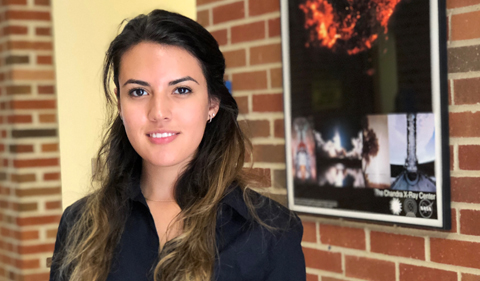By Ana Bucki-Lopez
(B.S. Physics, Astrophysics, College of Arts & Sciences, Class of 2019)
Editor’s Note: Ana Bucki-Lopez participated in a group project with astrophysicist Dr. Hee-Jong Seo in Physics & Astronomy. The researchers use a deep learning technique to model and mitigate various observational systematics when extracting the cosmological information from galaxy surveys. Her goal was to investigate for an optimal set of deep learning hyper- parameters to best remove such systematics. Ongoing and future large-scale galaxy surveys are crucial for deriving cosmological information such as on dark energy that cosmologists believe is responsible for the accelerated expansion of the recent Universe. The data from such surveys, however, are usually contaminated with observational systematics that need to be removed.
My summer internship was to help graduate student, Mehdi Rezaie, on his project on using machine learning to mitigate the effects of observational constraints in the collection of new data of the large-scale structure of the universe, to be applied to the extended Baryon Acoustic Oscillation Survey (eBOSS) and the Dark Energy Spectroscopic Instrument (DESI).
During my internship, I vastly expanded my knowledge of python and machine learning, as well as learned about the more abstract, computer science based side of cosmology. I also learned about the actual tedious process of research in the field of science, as well as the importance of collaboration.
If I had more time, I would continue running the program with more parameters as well as do research into other applications for this same methodology of using machine learning to alleviate data analysis in data collection. My personal next steps would be to continue expanding my knowledge of machine learning and possibly one day be able to write my own program with what I have learned this summer.
I came into the project knowing very little of machine learning and python language, so during the summer, I really learned by doing rather than using prior knowledge. Therefore, it was a challenge at times when it came to modifying parameters of the code, or translating the results.
I met Dr. Seo once a week at the beginning of the summer and later after she returned to America. Both Dr. Seo and Mehdi Rezaie were both traveling abroad for a lot of the summer, so we coordinated the internship mostly through email.
I am fascinated by how vastly machine learning applications; I had no previous knowledge of it being used in the field of cosmology. I also am very interested in the study of Baryon Acoustic Oscillation so being able to work on a project that could directly affect the future study of such topic was very exciting for me. I think machine learning definitely has an immense applicable future in the fields of cosmology and astrophysics and I am excited to see what will be possible in the future. I think that machine learning and the introduction of artificial intelligence to projects in these fields will lead to another revolution in the study of science.
I would definitely recommend summer internships and advise students to be undaunted by a project if they have little to no prior knowledge of it, but to apply themselves to it if it is something they are truly interested in. If I had shied away from this project because there were so many words I did not recognize I would have lost the opportunity to learn not only about the subject but also learn about myself my application to learning new things. I also definitely encourage anyone to try at least one summer of research in order to experience what constitutes a scientific career.




















Comments